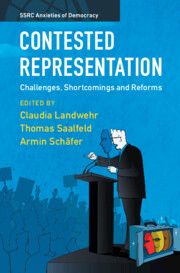Book contents
- Contested Representation
- SSRC Anxieties of Democracy
- Sponsored by the Social Science Research Council
- Contested Representation
- Copyright page
- Contents
- Figures
- Tables
- Contributors
- Acknowledgments
- 1 Introduction
- Part I The Contested Idea of Political Representation
- Part II Representation and Responsiveness in Unequal Societies
- Part III Polarization, New Cleavages, and Shifts in Democratic Government
- Part IV Constitutional Crisis and Institutional Reform
- 14 Deliberative Innovations and the (Re-)Inclusion of Disadvantaged and Underrepresented Citizens
- 15 Electoral Democracies and Democratic Innovations
- Bibliography
- Index
14 - Deliberative Innovations and the (Re-)Inclusion of Disadvantaged and Underrepresented Citizens
from Part IV - Constitutional Crisis and Institutional Reform
Published online by Cambridge University Press: 03 November 2022
- Contested Representation
- SSRC Anxieties of Democracy
- Sponsored by the Social Science Research Council
- Contested Representation
- Copyright page
- Contents
- Figures
- Tables
- Contributors
- Acknowledgments
- 1 Introduction
- Part I The Contested Idea of Political Representation
- Part II Representation and Responsiveness in Unequal Societies
- Part III Polarization, New Cleavages, and Shifts in Democratic Government
- Part IV Constitutional Crisis and Institutional Reform
- 14 Deliberative Innovations and the (Re-)Inclusion of Disadvantaged and Underrepresented Citizens
- 15 Electoral Democracies and Democratic Innovations
- Bibliography
- Index
Summary
Growing dissatisfaction and disaffection of citizens from the political process has spurred innovative thinking about democracy. In the past decade, a broad variety of deliberative innovations has emerged to involve citizens more directly into politics, ranging from traditional town hall meetings to planning cells, citizen juries, deliberative polling and deliberative assemblies. Deliberative innovations – combining direct participation and dialogue about pressing policy issues – have not only proliferated further in recent times, they are also increasingly institutionalized (Chwalisz 2020). As Mark E. Warren (Chapter 15) has emphatically put it, “We are seeing hundreds of thousands of new channels of citizen involvement in government in most countries in the world, often outside of the more visible politics of electoral representation, and mostly driven by problems of governance in complex societies.” Deliberative innovations are frequently viewed as effective tools to (re-)integrate underrepresented citizens into the democratic process and create more reciprocal relationships between citizens and political elites. If they are well designed, in other words, employ random selection of participants giving each participant an equal chance to participate, provide participants with balanced information materials to enhance their policy-specific knowledge and use appropriate facilitation techniques to counteract dominance patterns in discussion, then they are expected to be inclusive and responsive to the views and interests of all (including underrepresented people), at least in theory (see Polletta and Gardner 2018: 71).
- Type
- Chapter
- Information
- Contested RepresentationChallenges, Shortcomings and Reforms, pp. 259 - 276Publisher: Cambridge University PressPrint publication year: 2022

